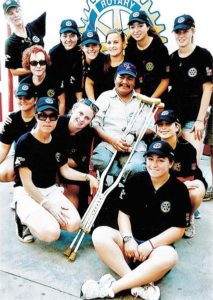Ken Behring, an American billionaire, made his fortune from poor beginnings through a series of businesses ranging from cars to real estate. But once he started gracing the pages of the rich lists, his attention turned to a wide range of philanthropic projects.

The book “Road to Purpose” documents the life of founder Kenneth E. Behring and is dedicated to all of the people in the world struggling with immobility.
He is the founder of the Wheelchair Foundation, donating 780,000 wheelchairs to 155 countries worldwide.
In China, the foundation has donated 262,000 wheelchairs. For the world Expo they are launching the Red Chair campaign with 2000 chairs donated to local community centers and including volunteers with each chair to help the recipient.
Behring has also donated to a number of museums worldwide, including record breaking donations to the Smithsonian National Museum of American History in Washington, D.C. In China avid hunter Behring has donated to a number of animal related exhibitions in Shanghai, Beijing, Tianjing and Dalian.
He was in early talks recently about donations for a Natural History Museum in Shanghai and development of retirement homes in China.
Q: Why did you start in the philanthropy field?
A: I live by the motto that I know how to earn money, spend money and give money. I have lived a wonderful life and I’ve had the opportunity to do everything I wanted, so it was time to do something more fulfilling.
As simple as it is, a wheelchair can change a person’s life completely — allowing them to go to work or school. And there’s an increasing need everyday in China with an aging population. All we want in return is a smile. In China, people particularly appreciate it because they’re not used to getting something for nothing. Sometimes I see the tears run down their face.
Q: What recipient stories have stayed in your mind?
A: I’m struck by people who come back to us with their stories after getting a wheelchair. These people are not disabled, they’re strong. There was a Chinese man, for example, who had gangrene in his leg and didn’t have the US$100 for an operation to save his life. We donated that and also a wheelchair. Then we heard his wife had found a job and he was caring for the family.
When I went to Beijing to give out wheelchairs, I met many people who had been trapped in their homes for 25 years. Similarly a woman in Turkey was trapped in bed for 35 years. Some young people just wanted to go outside and touch a leaf with their new mobility, because they’d never been able to do so.
Q: Why are you interested in retirement homes in China?
A: I think it’s a problem that’s not addressed in China with its rapidly aging population. There are people stuck up six flights of stairs with no elevator, and maybe with a broken hip. That’s not a life. I want to give them a reason to live.
When I was 40 years old I was developing retirement homes in Florida. I remember I had a scotch with them on New Year’s Eve and they were all in their 70s. We created not just buildings but a way of living with activities to keep them busy and being with others of the same age.
I really believed in the product, which is also why it was successful.
Q: Why are you interested in building museums and educational projects?
A: It’s great giving to young people because they adapt so much faster. Young people are our future. I’m so impressed by how hard students work here, and the intense competition for a place in university.
The standards here are higher than anywhere else in the world. That’s the reason China is more and more successful.
Q: Tell me about your early life and path to success?
A: We were poor and I worked hard. I never felt deprived, but my parents didn’t have much time for me so that meant I learned to make decisions by myself. That also requires being a bit of a rebel, never listening to anyone else.
However if something didn’t work I would be flexible to change. Many people want to prove they’re right — that’s not my attitude at all.
I have created businesses in everything from cars to funeral homes and feel the need to move to a new challenge every 10 years or so.
Q: What do you think of the entrepreneurial spirit in China?
A: China is willing to look at success and copy it. They’re not afraid of asking for help — which was also my attitude throughout my entrepreneurial career.
Of course every place has its problems, like air quality, water and traffic.
But there is a spirit of trying to find how we can solve these problems, not why it can’t be solved.
SOURCE: Shanghai Daily

